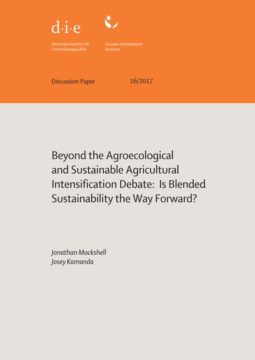With the Sustainable Development Goals (SDGs) has come a renewed global interest in ending hunger, achieving food security and preventing natural resource degradation. Despite this renewed interest and increased commitments to invest in agricultural development, there is an ongoing debate over the pathways to sustainability. The debate centres on sustainable agricultural intensification (SAI) and agroecological intensification (AEI) pathways to agricultural sustainability. Using a systematic literature review approach, this study examines the debate over AEI and SAI. This study employs a theoretical framework based on the economic, social, and ecological dimensions of sustainable agriculture within a policy and institutional space. Based on the sustainability dimensions, a discourse analytical technique is applied to unravel the debate. The results reveal that proponents of the SAI pathway are predominantly private sector actors, while support for the AEI pathway comes mainly from international donors, NGOs and civil society actors. Both pathways aim to promote food security; however, the actors differ on discourse relating to the concept of farming, the role of GMOs, the scale of operation, and land use, as well as views on the social, economic, and ecological dimensions of sustainability. Resolving these differences requires a blended sustainability approach that moves beyond the current AEI and SAI debate by acknowledging the tradeoffs and synergies of the socio-economic and ecological dimensions of the different pathways to sustainability. Knowledge platforms will support this shift, and an enabling policy and institutional environment will provide the right incentives to promote sustainable agriculture.
- Veröffentlicht am Samstag 23. November 2024 von Deutsches Institut f. Entwicklungspolitik
- ISBN: 9783960210399
- 42 Seiten
- Genre: Gesellschaft, Politik, Sachbücher, Wirtschaft
